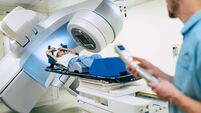'Listen to your body' - Cancer survivor urges people to act fast

#WorldCancerDay - Niamh Morrison pictured at home in Kileely, Limerick. She was diagnosed with diabetes and lung cancer in June 2018. Photo: Brian Arthur
Niamh Morrison has a small tattoo under her wrist with Love, Faith, Hope written inside tiny colourful hearts.
This was the mantra which got her through a lung cancer diagnosis, but she said it all started with a gut feeling there was something more seriously wrong than her first symptoms indicated.














